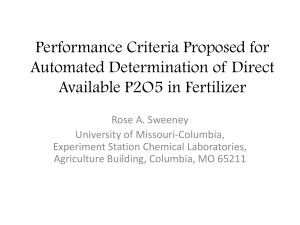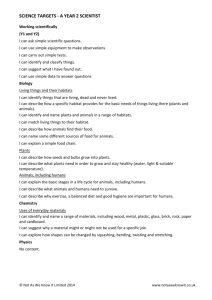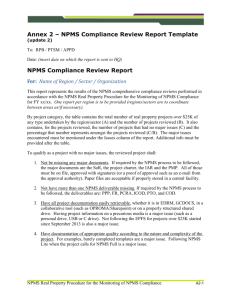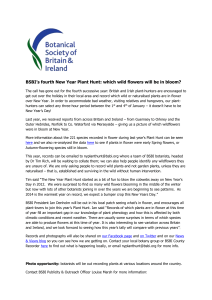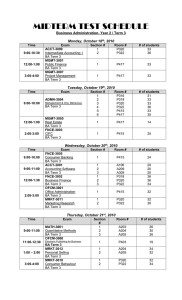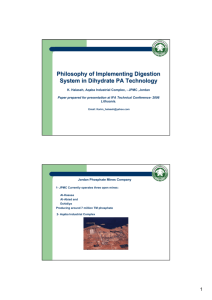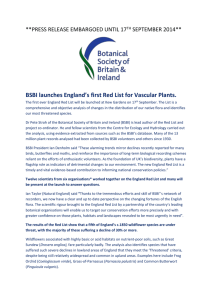every flower counts * volunteers needed for - Brompton-on
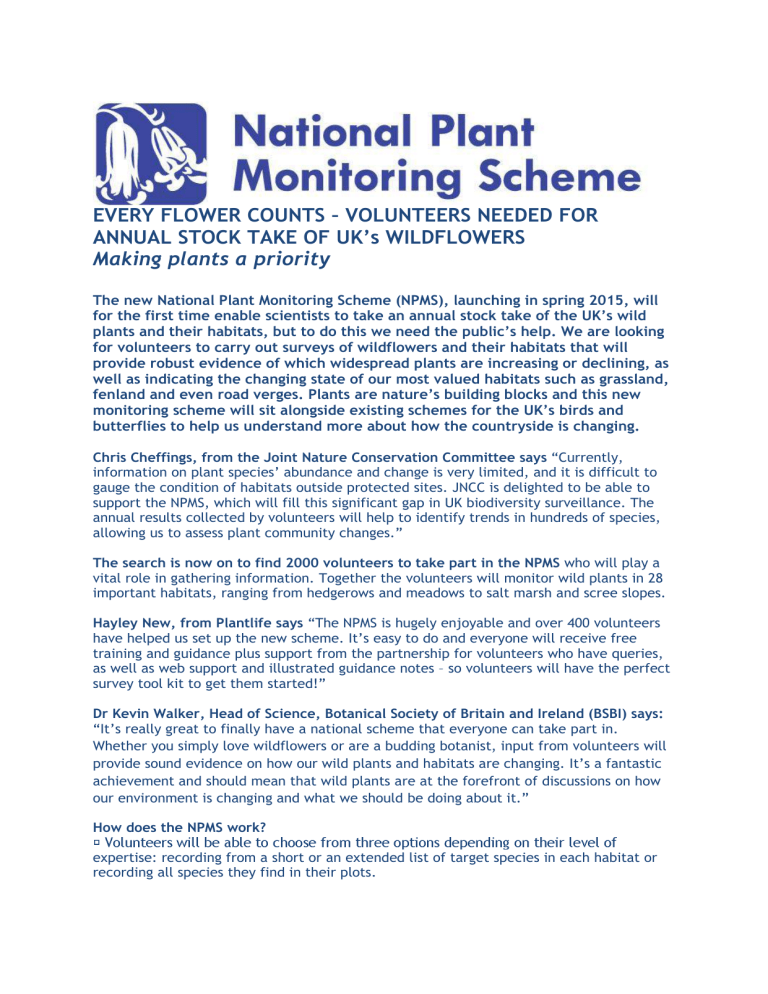
EVERY FLOWER COUNTS – VOLUNTEERS NEEDED FOR
ANNUAL STOCK TAKE OF UK’s WILDFLOWERS
Making plants a priority
The new National Plant Monitoring Scheme (NPMS), launching in spring 2015, will for the first time enable scientists to take an annual stock take of the UK’s wild plants and their habitats, but to do this we need the public’s help. We are looking for volunteers to carry out surveys of wildflowers and their habitats that will provide robust evidence of which widespread plants are increasing or declining, as well as indicating the changing state of our most valued habitats such as grassland, fenland and even road verges. Plants are nature’s building blocks and this new monitoring scheme will sit alongside existing schemes for the UK’s birds and butterflies to help us understand more about how the countryside is changing.
Chris Cheffings, from the Joint Nature Conservation Committee says “Currently, information on plant species’ abundance and change is very limited, and it is difficult to gauge the condition of habitats outside protected sites. JNCC is delighted to be able to support the NPMS, which will fill this significant gap in UK biodiversity surveillance. The annual results collected by volunteers will help to identify trends in hundreds of species, allowing us to assess plant community changes.”
The search is now on to find 2000 volunteers to take part in the NPMS who will play a vital role in gathering information. Together the volunteers will monitor wild plants in 28 important habitats, ranging from hedgerows and meadows to salt marsh and scree slopes.
Hayley New, from Plantlife says “The NPMS is hugely enjoyable and over 400 volunteers have helped us set up the new scheme. It’s easy to do and everyone will receive free training and guidance plus support from the partnership for volunteers who have queries, as well as web support and illustrated guidance notes – so volunteers will have the perfect survey tool kit to get them started!”
Dr Kevin Walker, Head of Science, Botanical Society of Britain and Ireland (BSBI) says:
“It’s really great to finally have a national scheme that everyone can take part in.
Whether you simply love wildflowers or are a budding botanist, input from volunteers will provide sound evidence on how our wild plants and habitats are changing. It’s a fantastic achievement and should mean that wild plants are at the forefront of discussions on how our environment is changing and what we should be doing about it.”
How does the NPMS work? expertise: recording from a short or an extended list of target species in each habitat or recording all species they find in their plots.
will be asked to visit three of those locations and carry out surveys in square plots and then identify two linear features such as hedgerows, rivers and road verges and survey these locations too. of interest.
Oliver Pescott, from the Centre for Ecology & Hydrology says “The results from this new scheme should allow us to quantify the smaller changes that are occurring within our most valuable habitats. In the past, volunteer-collected data have been able to demonstrate the results of large-scale habitat loss over the last century, now we would like to reveal even more detail about the changes within the remaining areas of these habitats in our landscape.”
For more information on the NPMS and how to take part please visit www.npms.org.uk
-ENDS-
NOTES TO EDITORS
For enquiries and interviews please contact Hayley New on hayley.new@plantlife.org.uk or call 07741 314155. We also have stunning images available.
The NPMS is a partnership of the Botanical Society of Britain and Ireland (BSBI), the
Biological Records Centre (within the Centre for Ecology & Hydrology), Joint Nature
Conservation Committee (JNCC) and Plantlife. The NPMS builds upon previous research projects funded by JNCC and Defra.
The Joint Nature Conservation Committee (JNCC) is the statutory adviser to the UK
Government and devolved administrations on UK and international nature conservation. Its work contributes to maintaining and enriching biological diversity, conserving geological features and sustaining natural systems.
The Botanical Society of Britain and Ireland (BSBI) has been promoting the study, understanding and enjoyment of British and Irish wild plants since 1836. BSBI supports and encourages research and conservation, and is one of the world's largest contributors of biological records, collected by our volunteer members - amateur and professional botanists who benefit from our research, training and outreach programmes.
The Centre for Ecology & Hydrology (CEH) is a world-class research organisation focussing on land and freshwater ecosystems and their interaction with the
atmosphere. We are a Natural Environment Research Council (NERC) Research
Centre and integral to the delivery of the NERC Strategy, The Business of the
Environment, with over 425 researchers and students based at sites in England,
Scotland and Wales.
W: www.ceh.ac.uk E: enquiries@ceh.ac.uk T: 01491 838800
Plantlife is the charity speaking up for the nation’s wild plants. We work hard to protect wild plants on the ground and to build understanding of the vital role they play in everyone’s lives. Plantlife carries out practical conservation work across the UK, manages nature reserves, influences policy and legislation, runs events and activities that connect people with their local wild plants and works with others to promote the conservation of wild plants for the benefit of all.
